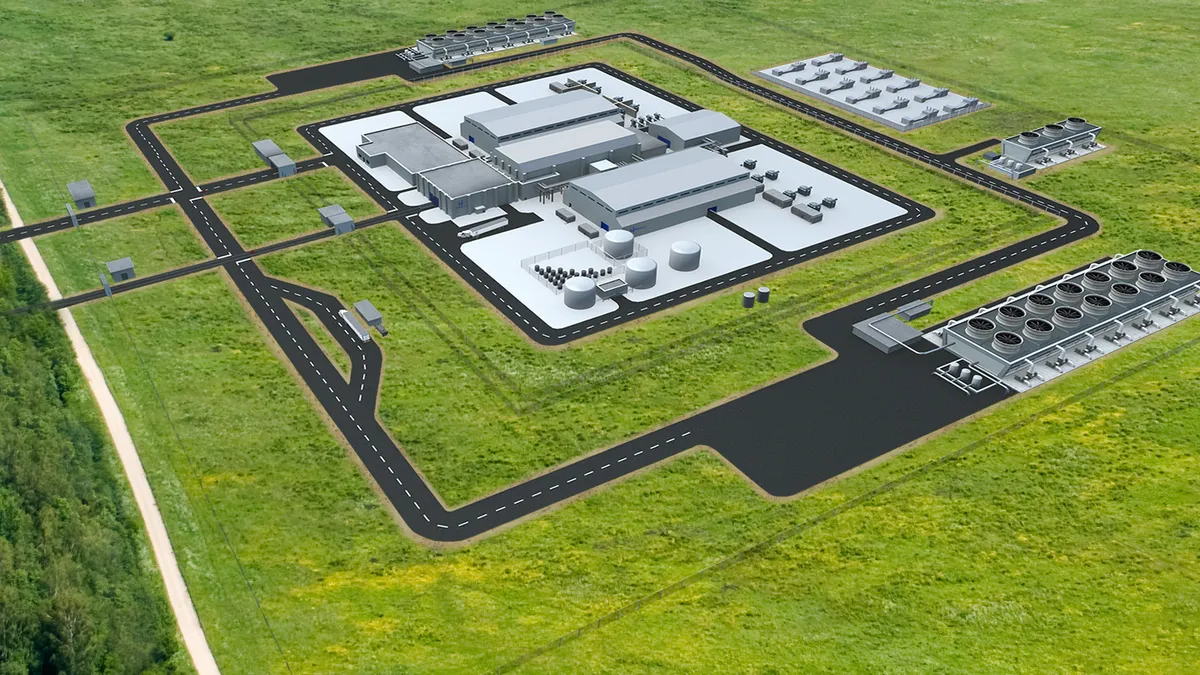Dive Brief:
- NuScale Power on Monday announced that it had signed a memorandum of understanding (MOU) to consider future partnerships with Xcel Energy for the operation of its advanced nuclear power plants.
- While Monday's announcement does not include a formal operating agreement, the MOU process would develop a framework for Xcel as NuScale's "preferred partner" for operational power plant services.
- U.S. nuclear regulators proposed a final rule in July certifying NuScale's plant design, which is the first small modular reactor (SMR) design the U.S. has approved.
Dive Insight:
Nuclear staffing and operations is highly specialized, experts agree. Some see opportunities for utilities with trained nuclear staff to operate advanced nuclear reactors.
"A plant like NuScale will likely have less specialized staff since it has greatly simplified the number of nuclear safety related systems. However, NuScale is still a water cooled reactor and as such most of the staff do not need to be retrained," Koroush Shirvan, nuclear science and engineering professor at the Massachusetts Institute of Technology, said in an email.
Xcel operates the Monticello and Prairie Island nuclear plants in Minnesota, which receive the highest possible ratings from the Nuclear Regulatory Commission (NRC) and the Institute of Nuclear Power Operations, said Diane Hughes, NuScale's vice president of marketing and communications. The utility has announced plans to extend Monticello's license from 2030 to 2040.
In addition, Xcel is carrying out a nuclear-powered hydrogen demonstration in partnership with the Department of Energy (DOE). The public-private partnership, announced in November, would demonstrate high-temperature steam electrolysis technology using heat and electricity from one of Xcel's plants.
"This shows that Xcel is looking at a lot of ways to keep its nuclear assets in the game. Now we can see from their MOU that they're very interested in ... expanding or maintaining their expertise in the [nuclear] space," Brett Rampal, director of nuclear innovation at the Clean Air Task Force, told Utility Dive. "Premature retirements of nuclear power plants can sometimes make it difficult for a nuclear operator to maintain its best workers."
However, the MOU is not an "indicator of any real interest in the nuclear sector," Shirvan said.
An Xcel spokesperson called the MOU an opportunity to provide feedback using the company's operations experience.
"We sit on several technical advisory boards with companies working on small modular reactors, which allows us to provide direct feedback on what nuclear operators need and how designs can be improved to meet the needs of utilities and their customers," Matt Lindstrom, an Xcel spokesperson, said in an email.
NuScale's search for potential plant operators for its technology takes place as the company seeks to commercialize its SMR design by the end of this decade. Utah Associated Municipal Power Systems (UAMPS), an electric cooperative, is planning to build six NuScale SMRs in Idaho as part of a DOE initiative.
The MOU could lead to smoother pathways toward plant operations for clients like UAMPS. The DOE awarded UAMPS nearly $1.4 billion last year to develop the commercial reactors.
"A decision to identify Xcel as NuScale’s preferred operator is only considered internally among the Xcel and NuScale organizations," independent of the NRC, Hughes said.
The application for a plant's operating license is typically done in tandem with other approval processes for the project. The NRC continuously evaluates nuclear operator licenses. Should a NuScale customer select Xcel to operate its NuScale plant, the NRC would review and approve Xcel's qualifications during the combined license application review, Hughes said.
"It's up to [NuScale's] potential customers to determine their level of risk, to develop their own operator capabilities or to use a third party," Rampal, a former nuclear engineer with NuScale, said.
Depending on the finances of NuScale's customers, some might invest in longer-term savings by pursuing their own plant operating license, while others might prefer to avoid the higher cost of licensing upfront.
"Following these [MOU] discussions, should Xcel become NuScale’s preferred operator, NuScale would recommend Xcel to those NuScale customers who request operational support," Hughes said.
"I think the industry can have a relatively high barrier to entry in some areas, but many developers are seeking novel approaches in response. However, some barriers are related to strong independent regulation in the U.S. and are unlikely to quickly — or ever — change," Rampal said.
The discussions that will take place under the MOU will not require any communication with the NRC, the companies said.















